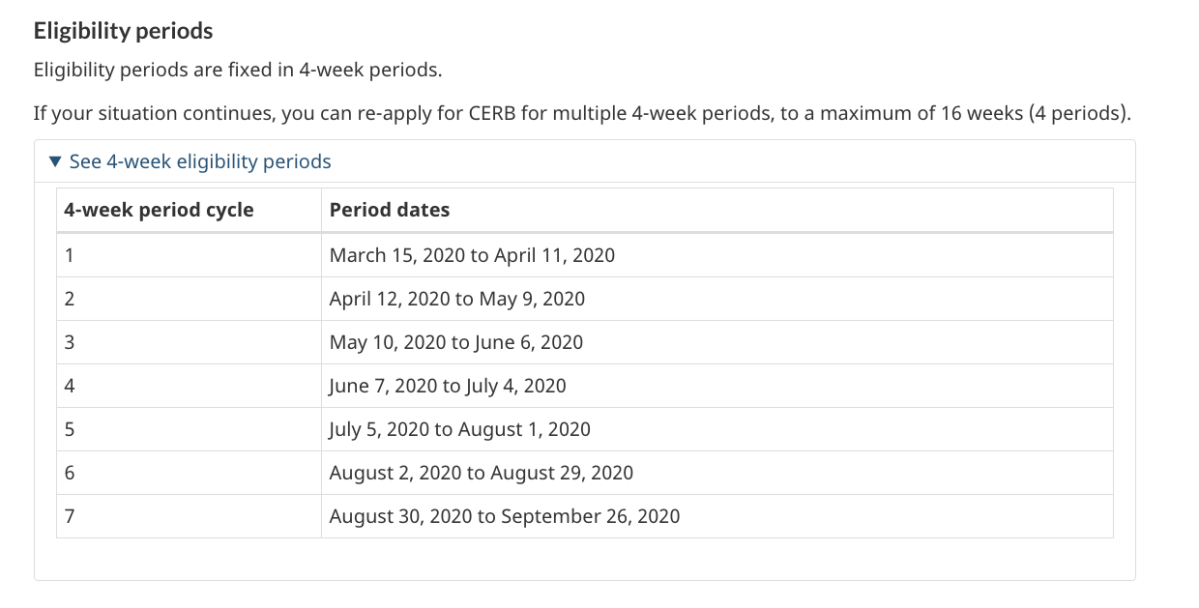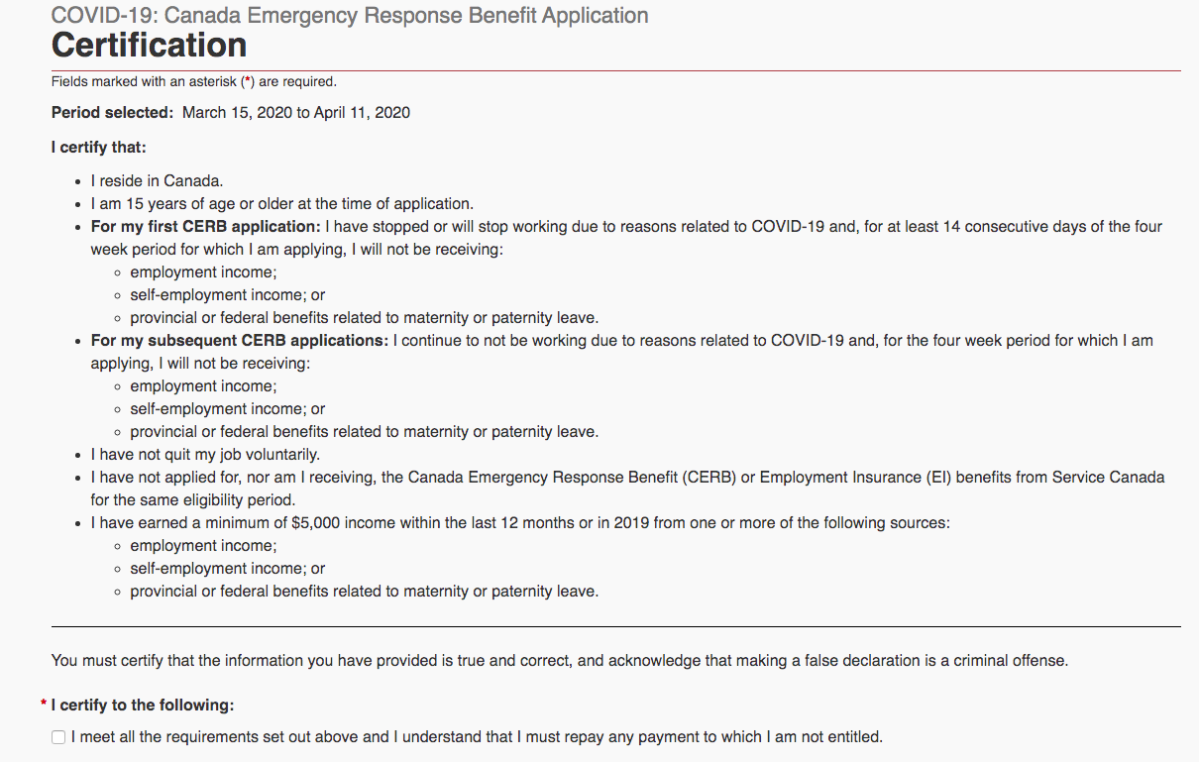The federal government has, as of April 6, started accepting applications for the new Canada Emergency Response Benefit for workers affected by the coronavirus pandemic.

CERB pays $2,000 every four weeks for up to four months to workers who have lost all of their income as a result of COVID-19. The benefit is open both to Canadians who qualify for employment insurance (EI) and those who don’t, including employees who don’t have enough work hours to meet EI requirements and the self-employed.
A statement from the minister of national revenue’s office said that a total of 3.18 million applications were received as of 3 p.m. ET, and that the Canada Revenue Agency was processing 1,000 applications per minute on average.

READ MORE: The Canada Emergency Response Benefit for COVID-19: who’s eligible and how to apply
Am I eligible for CERB?
To be eligible for CERB you must:
- Be a Canadian resident
- Be at least 15 years old when you apply
- Have lost all of your income for reasons related to COVID-19. This includes being laid off or seeing business dry up because of the economic consequences of the pandemic. It also includes losing the ability to earn money because you are sick with the novel coronavirus, quarantined, caring for someone with COVID-19 or looking after children who are either sick with the virus or home from school and daycare. Note that you don’t need to have been laid off to qualify for CERB. If you’re not receiving income from your employer, you can apply for CERB even if you are still formally employed.
- You earned at least $5,000 in income in the last 12 months or in 2019 from work (whether employment or self-employment) or from maternity and parental benefits (whether EI or through Quebec’s Parental Insurance Plan).
- You have — or expect to have — no income from the above-listed sources for at least 14 days in a row of the initial four-week period for which you are applying. You must also expect to continue to have zero income due to COVID-19 in order to continue to re-apply for the benefit.
- If you also qualify for EI regular unemployment or sickness benefits: if you became eligible for EI on March 15, 2020, or later, your claim will automatically be processed for CERB. Notably, you will get CERB even if you’d normally receive more than $2,000 a month under EI. On the other hand, everyone who would receive less than $2,000 through EI will get a pay bump through the new benefit. Also, CERB will not eat into your EI entitlement. After four months of CERB, you could still receive EI benefits for however many weeks you’d be eligible for regardless of CERB. (For more details about how CERB fits in with the EI program, please see here.)

Eligibility for CERB is set in four-week periods beginning with the period starting on March 15 and ending on April 11:
CERB is available from March 15 to Oct. 3. The deadline for applications is Dec. 2.

Get weekly money news
You are not eligible for CERB if you quit your job voluntarily (even if it was because of COVID-19), have lost some but not all of your income, or lost your job for reasons other than the health emergency. If you would otherwise qualify for CERB but became eligible for EI unemployment or sickness benefits before March 15, you’ll receive EI instead. If you’re unable to find a job because of the pandemic when your EI runs out, you’ll be eligible to transition to CERB.

Where do I go to apply?
There are two ways to apply for CERB: online and through an automated phone system.
Online, you apply through the CRA’s My Account portal. If you don’t have one, here’s how to register for it.
If applying by phone, call 1-800-959-2019 or 1-800-959-2041.
READ MORE: Canadians who didn’t have a job even before coronavirus — what help can they get?
When can I apply?
The earliest you get to apply depends on the month in which you were born. For January through March, you’ll be able to send in your application on Mondays, starting on April 6. For April-through-June babies, application day is Tuesday, starting on April 7. Those born in July through September get Wednesdays, and those with birthdays in the last three months of the year get Thursdays. Fridays, Saturdays and Sundays are freebies open to anyone who qualifies.
The staggered application process is Ottawa’s attempt to ensure the system doesn’t become overwhelmed with potentially millions of applications coming in at once.
The government is accepting both online and phone applications 21 hours a day, seven days a week. Both services will be closed daily from 3 a.m. to 6 a.m. ET for maintenance.
READ MORE: Recent EI beneficiaries to move to federal coronavirus emergency benefit — and many will get a raise
What documents am I going to need?
All you need is your social insurance number, your contact information and your ability to declare that you are eligible for CERB. There is no need to submit a medical certificate if you are claiming to be sick or caring for someone who is sick.
The government is relying on the honour system for now in order to get financial aid to Canadians as quickly as possible. However, you may be asked to provide additional documentation to prove your eligibility at a later date. If it turns out you did not qualify for CERB, you’ll have to repay the benefit.
Also, make sure your contact and payment information on My Account is up to date before you start your application.

What’s the application process like?
Online:
- Go to CRA My Account
- As you as you log in, you’ll see a bright blue box at the top about the Canada Emergency Response Benefit
- The application process is very short but before you send off your application, you’ll be asked to certify that you qualify for CERB.
If you have My Service Canada Account, you can sign into CRA My Account without having to register:
- Sign into My Service Canada Account
- Click on “Switch to Canada Revenue Agency” and you’ll be transferred to CRA My Account
- Update your address and direct deposit with CRA (CRA does not have your personal information from your My Service Canada Account)
By phone:
- Select whether you prefer to receive prompts in English or French.
- Follow the instructions, including providing your SIN, confirmation of your postal code and the period you are applying for.
- Declare that you qualify for CERB.
If applying by phone, know that there were some reports of significant delays and clogged lines as of Monday, April 6, the first day that the government started accepting applications.
When will I get the money?
Benefits will start within 10 days of when you submit your application. You can choose to receive the money either by cheque or direct deposit (which should be faster). Payments will be made retroactively based on your eligibility date.












Comments
Want to discuss? Please read our Commenting Policy first.